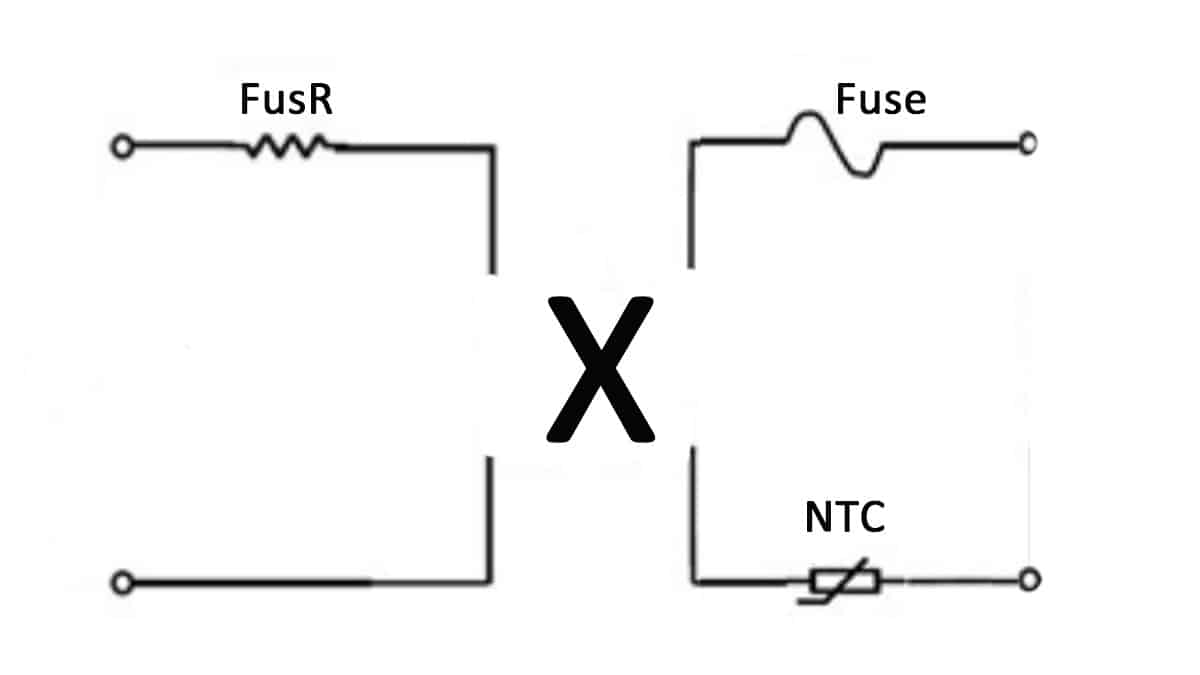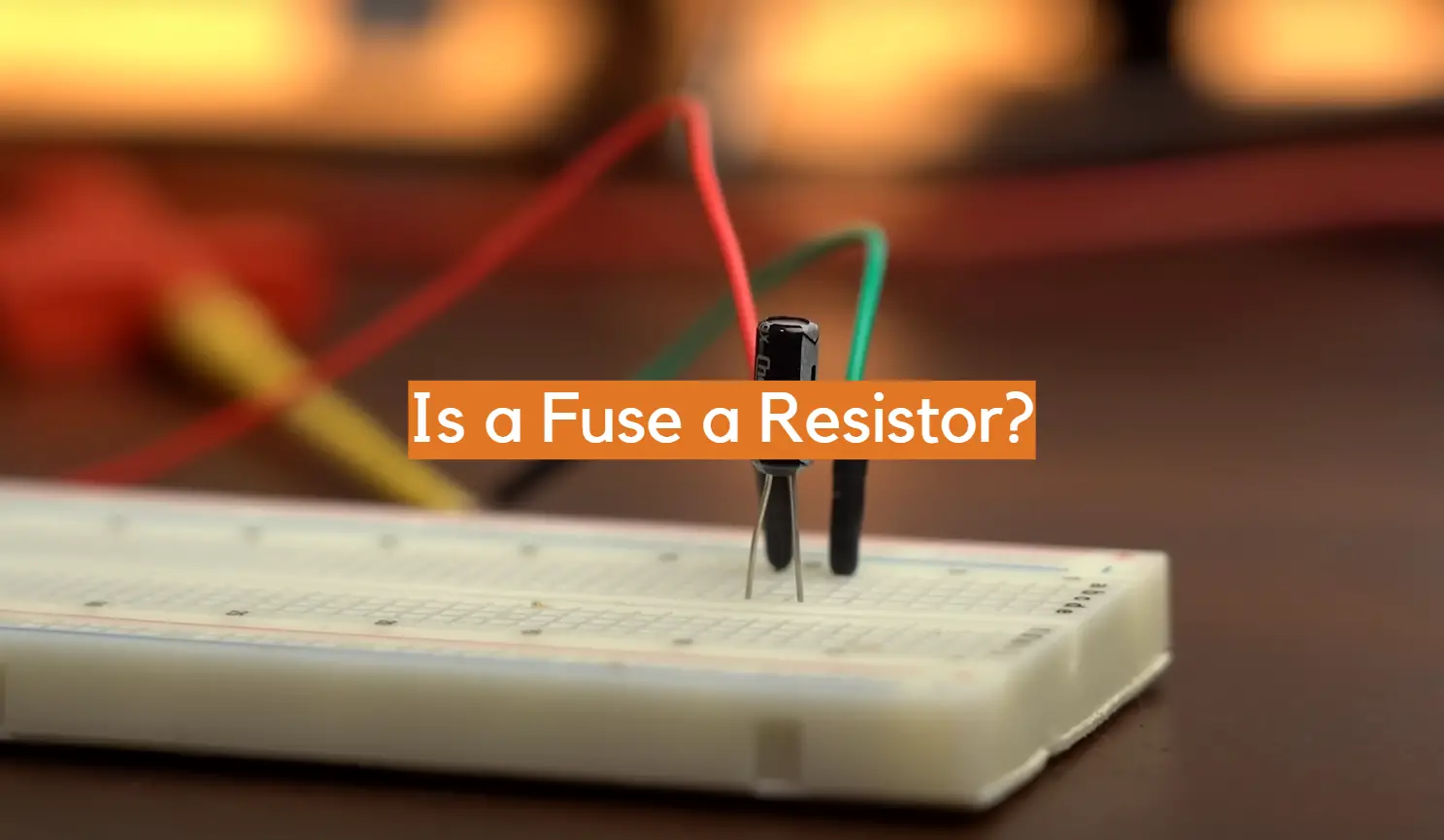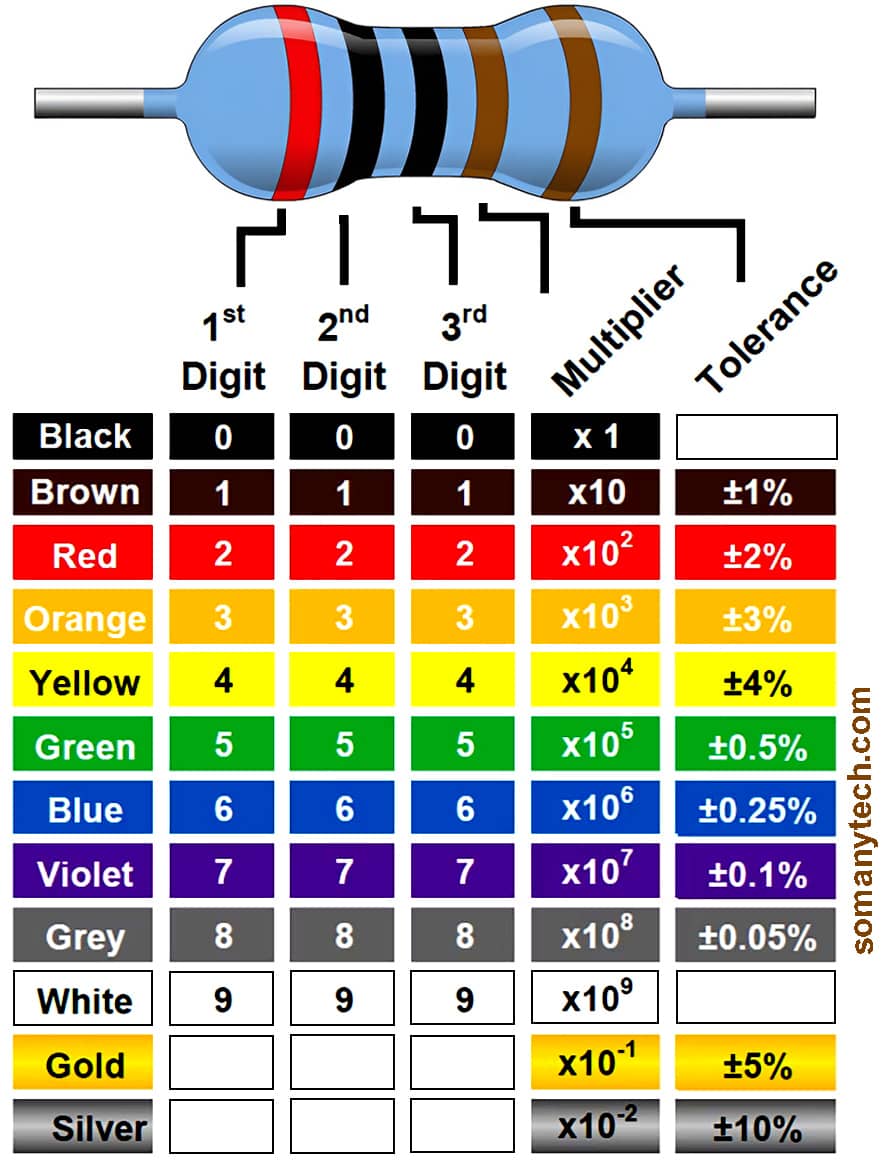Build A Tips About Is A Fuse Resistor

The Great Fuse-Resistor Debate
1. Unveiling the Mystery of Fuses and Resistors
Okay, let's tackle this head-on. You're probably wondering, "Is a fuse just a fancy resistor in disguise?" It's a fair question! At first glance, both components seem to play with electricity in some way. But hold on, before you start swapping fuses for resistors in your circuits, let's dig a little deeper. We need to understand what makes each of these electrical components tick. Trust me, there's more to it than meets the eye, and a little electrical understanding can save you a lot of headaches (and possibly some sparks!).
Think of it this way: a resistor is like a narrow hallway in a building. It lets people (electrons, in this case) through, but slows them down a bit, creating resistance. A fuse, on the other hand, is more like a drawbridge. It's normally down, allowing traffic to flow freely. But if too much weight (too much current) comes along, the drawbridge snaps, stopping everything in its tracks. So, while both affect the flow of electricity, their fundamental purpose is quite different.
We'll explore this difference in detail, examining how each component is constructed and its primary purpose in a circuit. Get ready to have your electrical preconceptions challenged! Maybe you already know some of this, or maybe you're completely new to the world of electronics. Either way, this should be a fun and informative journey. Let's get to the real heart of the matter, because you dont want to fry your motherboard, do you?
And to make things even more interesting, we will also consider some edge cases and scenarios where the lines might get a little blurred. For example, under specific circumstances, a fuse will exhibit some of the behaviors wed expect from a resistor, but these cases do not make the fuse and the resistor functionally equivalent. These nuances are what make electronics both fascinating and, at times, a little confusing. It's like trying to decide if a square is a rectangle or not technically, yes, but thats not the whole picture.

Resistors
2. Understanding Resistor Functionality
Resistors, in essence, are the traffic cops of the electronic world. They regulate the flow of electrical current within a circuit. They introduce a specific amount of opposition, measured in ohms, to the current. This opposition is what we call resistance. By carefully selecting resistors with different resistance values, designers can control the voltage and current levels at various points in the circuit.
Imagine a garden hose with a kink in it. The kink restricts the flow of water, right? That's essentially what a resistor does to electrical current. It doesn't completely stop the flow, but it limits it. This is crucial for protecting sensitive components from overcurrent and for ensuring that each part of the circuit receives the correct amount of power. Without resistors, many of our electronic gadgets would simply burn out in a blaze of glory!
Resistors come in a mind-boggling array of sizes, shapes, and resistance values. You can find tiny surface-mount resistors that are smaller than a grain of rice, as well as hefty wire-wound resistors designed to dissipate significant amounts of heat. The resistance value is often indicated by a series of colored bands painted on the resistor body. These bands form a code that allows you to quickly determine the resistance without having to measure it with a multimeter.
Think about the volume control on your radio. That's often a potentiometer, a type of variable resistor. By turning the knob, you're changing the resistance, which in turn changes the amount of current flowing to the speakers, thus adjusting the volume. Resistors are fundamental building blocks, and without them, our digital world simply wouldn't exist as we know it. They work in the shadows, making sure everything functions correctly and keeps on working!

Rxf WireWound Fuse Resistor, 1W Resistor And
Fuses
3. Delving into Fuse Operation
Fuses are the unsung heroes of electrical safety. Their primary job is to protect circuits from overcurrent situations. A fuse is a sacrificial device; it's designed to break the circuit if the current exceeds a predetermined level. This prevents damage to other components and, more importantly, prevents electrical fires and other hazards.
A typical fuse consists of a thin wire or strip of metal encased in a non-combustible housing. This wire is carefully chosen to melt and break the circuit when the current exceeds its rated value. When the wire melts, it creates an open circuit, stopping the flow of electricity. It's a bit like a controlled self-destruction sequence, but in a good way!
Fuses are rated in amperes (amps), which indicates the amount of current they can safely carry. If the current exceeds this rating, the fuse will blow. It's crucial to use the correct fuse rating for a given circuit. Using a fuse with a higher rating than necessary can defeat the purpose of the fuse and leave the circuit vulnerable to damage. Using a lower rating, on the other hand, can cause the fuse to blow unnecessarily.
Consider the wiring in your home. Each circuit is protected by a circuit breaker (which acts much like a reusable fuse) or a fuse in the electrical panel. If you overload a circuit by plugging in too many appliances, the fuse will blow, preventing the wiring from overheating and potentially causing a fire. Fuses are essential safety devices that protect both our equipment and ourselves.

Is A Fuse Resistor? ElectronicsHacks
So, Are They the Same or Not? The Definitive Answer
4. Comparing and Contrasting Fuses and Resistors
Alright, lets get down to the brass tacks. While both fuses and resistors interact with electrical current, their core functions are drastically different. A resistor restricts current to a specific, designed level. It's a constant, predictable influence. A fuse, however, allows current to flow normally until a dangerous threshold is reached, at which point it interrupts the current entirely. It's a reactive, safety-focused device.
Think of it like this: a resistor is like a dimmer switch on a light. You can use it to control the brightness (current) to the level you want. A fuse is like a fire alarm. It doesn't affect the light under normal circumstances, but it springs into action when there's a problem (overcurrent) to prevent a disaster. Therefore, their applications are also distinct.
Fuses are all about safety and are there to prevent serious damage to your electronic devices or wiring. Resistors, though, are vital for the function of any electronic circuit, from voltage dividers and current limiters to setting bias points for transistors. You cant usually interchange these devices, as it can cause serious issues, like damaged devices or potential fire hazards.
Ultimately, saying a fuse is a resistor is a bit like saying a car is a bicycle because they both have wheels. Technically true on the surface, but completely missing the fundamental purpose and design of each device. While a fuse may exhibit some minimal resistance under normal operation (all conductors do), that's not its primary function. Its primary function is to break the circuit under overcurrent conditions. Therefore, no, a fuse is not a resistor — they play entirely different roles in the world of electronics.

But What About That Tiny Bit of Resistance in a Fuse?
5. The Nuances of Fuse Resistance
Ah, good question! It's true that a fuse, like any conductor, possesses a small amount of resistance. This resistance is usually very low, often measured in milliohms. It's a necessary consequence of the material properties of the fuse element. After all, even the best conductors aren't perfectly resistance-free.
However, it's crucial to remember that this resistance is incidental to the fuse's primary function. The fuse isn't designed to control current through resistance; it's designed to interrupt current when it exceeds a safe level. The small amount of resistance is simply a side effect of the materials used to create the fuse element.
In most circuit designs, this small resistance can be safely ignored. It's usually negligible compared to the other resistors in the circuit. However, in very sensitive or high-current applications, the resistance of the fuse may need to be taken into account. This is especially true when dealing with precision measurements or power calculations.
Think of it like this: a doorway has a certain amount of friction. You need to exert a small force to push the door open. That friction is analogous to the resistance of the fuse. It's there, but it's not the reason the door exists. The door exists to provide access or to close off a space, just as the fuse exists to protect a circuit from overcurrent. Therefore, while it's technically correct that a fuse has some resistance, it's not what defines it.
